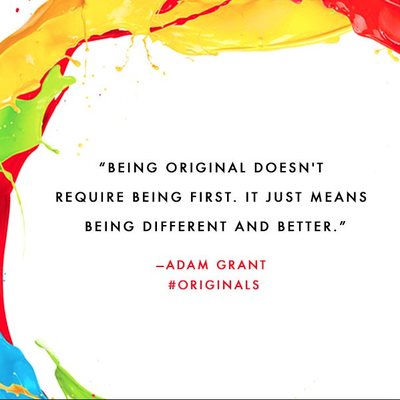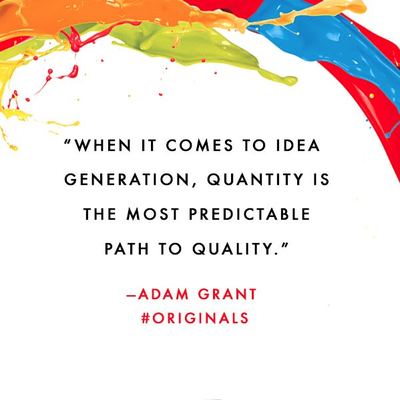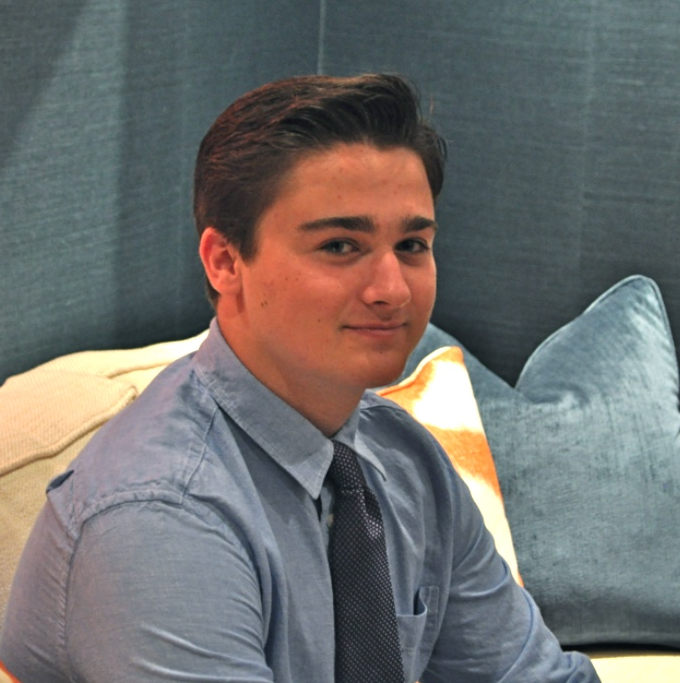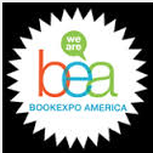I have been a Malcolm Gladwell fan for a really long time. So when he described the author Adam Grant as "one of my favorite thinkers," I knew I had to read Mr. Grant's new book Originals. Originals is a completely amazing book about generating new ideas and being confident enough to go against the mainstream and pursue those ideas. It's also about how parents can encourage creative kids to be original thinkers, how leaders like politicians or sports heroes get people to follow them and how challenging old or stale ideas is the only way to cultivate true innovation that is capable of changing the world.
My favorite chapter of Originals (and the one I chose to discuss with the Raiareads students) was Chapter 6: Rebel With A Cause. This chapter just happened to combine a number of my favorite things: baseball statistics, sibling rivalry, stand-up comedy and finding mentors through characters in literature. I felt at one point like he was talking to me in the chapter. Grant gives the reader fascinating statistics about stealing bases in baseball and sibling order to show how peoples' ability to tolerate (or seek) risk can actually follow certain patterns. This became even more interesting when he moved the discussion to stand-up comedians and how their birth order in their family can often foreshadow their need to stand out and "own" a room. I have been doing some stand-up comedy in NYC lately and this section rang eerily true.
I also really liked the section where he experimented with the wording of public health signs in hospitals, proving that signs that encouraged workers to wash their hands for the benefit of others resulted in 10% more hand washing. I plan to pose a similar question to the Raiareads students later this month about cheating and will be interested to see whether signs that discourage cheating because it prevents their classmates from learning and hurts the schools' reputation are more effective than those that just warn students about damage to themselves (see our Discussion Questions here).
The best part of the chapter, though, was the discussion about finding mentors. Grant notes that sometimes it's hard for a kid to find mentors in his or her daily life, and that some of the best mentors can be found in literature. He says that Mark Zuckerberg, for example, connected with Ender in Ender's Game (which we read last year). I emailed Mr. Grant on behalf of Raiareads to ask about his most important mentors, both in real life and in fiction, and his answers -- which I won't divulge here because they were written only for the Raiareads students -- were fantastic. I am seriously grateful that he took the time to answer us during the first week that the book was out!
Overall, Originals is right up there for me with Malcolm Gladwell's books, and I can't wait for more. It is filled with cool anecdotes and statistics, and I really hope that the students (and their parents) like Chapter 6 as much as I liked the whole book.
My favorite chapter of Originals (and the one I chose to discuss with the Raiareads students) was Chapter 6: Rebel With A Cause. This chapter just happened to combine a number of my favorite things: baseball statistics, sibling rivalry, stand-up comedy and finding mentors through characters in literature. I felt at one point like he was talking to me in the chapter. Grant gives the reader fascinating statistics about stealing bases in baseball and sibling order to show how peoples' ability to tolerate (or seek) risk can actually follow certain patterns. This became even more interesting when he moved the discussion to stand-up comedians and how their birth order in their family can often foreshadow their need to stand out and "own" a room. I have been doing some stand-up comedy in NYC lately and this section rang eerily true.
I also really liked the section where he experimented with the wording of public health signs in hospitals, proving that signs that encouraged workers to wash their hands for the benefit of others resulted in 10% more hand washing. I plan to pose a similar question to the Raiareads students later this month about cheating and will be interested to see whether signs that discourage cheating because it prevents their classmates from learning and hurts the schools' reputation are more effective than those that just warn students about damage to themselves (see our Discussion Questions here).
The best part of the chapter, though, was the discussion about finding mentors. Grant notes that sometimes it's hard for a kid to find mentors in his or her daily life, and that some of the best mentors can be found in literature. He says that Mark Zuckerberg, for example, connected with Ender in Ender's Game (which we read last year). I emailed Mr. Grant on behalf of Raiareads to ask about his most important mentors, both in real life and in fiction, and his answers -- which I won't divulge here because they were written only for the Raiareads students -- were fantastic. I am seriously grateful that he took the time to answer us during the first week that the book was out!
Overall, Originals is right up there for me with Malcolm Gladwell's books, and I can't wait for more. It is filled with cool anecdotes and statistics, and I really hope that the students (and their parents) like Chapter 6 as much as I liked the whole book.





